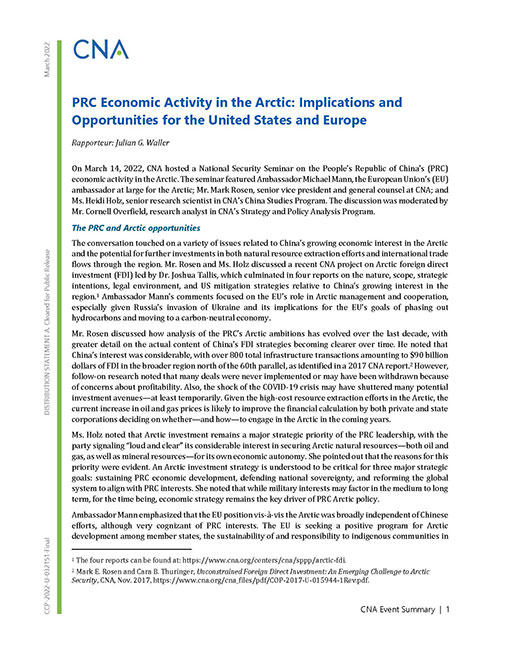The conversation touched on a variety of issues related to China’s growing economic interest in the Arctic and the potential for further investments in both natural resource extraction efforts and international trade flows through the region. Mr. Rosen and Ms. Holz discussed a recent CNA project on Arctic foreign direct investment (FDI) led by Dr. Joshua Tallis, which culminated in four reports on the nature, scope, strategic intentions, legal environment, and US mitigation strategies relative to China’s growing interest in the region. Ambassador Mann’s comments focused on the EU’s role in Arctic management and cooperation, especially given Russia’s invasion of Ukraine and its implications for the EU’s goals of phasing out hydrocarbons and moving to a carbon-neutral economy.
Mr. Rosen discussed how analysis of the PRC’s Arctic ambitions has evolved over the last decade, with greater detail on the actual content of China’s FDI strategies becoming clearer over time. He noted that China’s interest was considerable, with over 800 total infrastructure transactions amounting to $90 billion dollars of FDI in the broader region north of the 60th parallel, as identified in a 2017 CNA report. However, follow-on research noted that many deals were never implemented or may have been withdrawn because of concerns about profitability. Also, the shock of the COVID-19 crisis may have shuttered many potential investment avenues—at least temporarily. Given the high-cost resource extraction efforts in the Arctic, the current increase in oil and gas prices is likely to improve the financial calculation by both private and state corporations deciding on whether—and how—to engage in the Arctic in the coming years.
Ms. Holz noted that Arctic investment remains a major strategic priority of the PRC leadership, with the party signaling “loud and clear” its considerable interest in securing Arctic natural resources—both oil and gas, as well as mineral resources—for its own economic autonomy. She pointed out that the reasons for this priority were evident. An Arctic investment strategy is understood to be critical for three major strategic goals: sustaining PRC economic development, defending national sovereignty, and reforming the global system to align with PRC interests. She noted that while military interests may factor in the medium to long term, for the time being, economic strategy remains the key driver of PRC Arctic policy.
Download reportDISTRIBUTION STATEMENT A. Cleared for Public Release
Details
- Pages: 2
- Document Number: CCP-2022-U-032151-Final
- Publication Date: 3/14/2022
